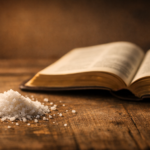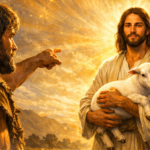
Text: John 2:1-11
Theme: “Trusting the Miracle Maker”
___________________________
Intro – Christians are often challenged in their faith in miracles, especially those performed by Jesus, because they seem impossible at first glance. But to begin this sermon, I want to share with you four “miracles” proclaimed in our secular world that I find even harder to believe:
- Getting something from nothing.
- Getting life from non-life.
- Getting order from chaos.
- Getting the immaterial from physical matter.
These ideas, often accepted in naturalistic or philosophical worldviews, ask us to believe in events that defy logic and scientific observation. They require a kind of faith that assumes these impossibilities happened without a divine Creator.[1]
That being said, when we talk about miracles, it doesn’t mean we want to explain them so that natural reason can accept them. As we reflect on the miracles of Jesus, let’s consider what they reveal: a God who not only made the world but enters into it to restore and redeem it. That is the kind of miracle we can truly have faith in.
Weddings in first-century Jewish culture were grand celebrations, often lasting up to seven days. These were not just family gatherings; they were significant community events filled with food, drink, and joyous festivities. To run out of wine wasn’t just an inconvenience; it was a major embarrassment and a breach of hospitality, tarnishing the family’s reputation. It’s in this context of cultural importance, joyous celebration, and looming social disaster that Jesus performs His first miracle.
Jesus starts His ministry’s miracles with one that might surprise us—turning water into wine. This wasn’t grape juice or some symbolic gesture; it was real wine, meant to keep the celebration going.
I want to point out here three important aspects:
- Jesus’ Autonomy: When Mary mentions the lack of wine, Jesus replies, “My hour has not yet come.” He makes it clear that His ministry will unfold according to God’s timing, not human expectations.
- Jesus’ Care for People: Even though His “hour” wasn’t fully revealed, Jesus still acts with compassion. He saves the day for the hosts, likely close family or friends.
- Jesus’ Power and Purpose: This miracle isn’t just about wine; it’s a sign. Signs serve a purpose: to reveal that the Messiah has come. Many before Jesus claimed to be someone great, but His miracles point to a unique identity—God in the flesh.
Here are also some parallels between Jesus’ first miracle and the greatest miracle—His resurrection:
- The Third Day: Jesus’ first miracle happens on the third day of the wedding celebration. The resurrection, the greatest miracle, also happens on the third day, marking the victory over sin and death.
- The Wedding Feast: The first miracle takes place at a wedding, a celebration of union and joy. The resurrection confirms that Jesus is the groom and the Church is His bride, united forever in His love.
- God’s Timing: Just as Jesus turned water into wine at exactly the right moment, His miracles always happen in God’s perfect timing. They remind us that God’s ways are higher than ours.
Miracles in daily life
What is the purpose of God’s miracles? What do they do for us? As we look at Jesus’ miracles, we see how they invite us to trust not only in His power but also in His love and purpose for our lives.
Miracles challenge our doubts, affirm our faith, and always point to Jesus, not to us. As 1 Corinthians 12 mentions, miracles are among the spiritual gifts. Do Lutherans believe that miracles can happen through people? Absolutely. If the Bible says so, who are we to doubt it? But there are three key factors to consider:
- The miracle must truly happen—not a trick, not manipulation, and not mass hallucination.
- The miracle must be done by God through the person; the power is not in the person.
- The miracle must glorify Jesus, not the individual.
Every miracle in Scripture directs us to Jesus. They are never performed to impress people but to reveal to people God’s kingdom breaking into our world. The miracle of faith itself connects us to God. We do not seek miracles for their own sake; we pray, trust, and let God act.
How do you respond to God’s miraculous work in your life? Remember, when all you have is reason, miracles—whether secular or divine—are hard to accept. But when you live in trust, you see the Miracle Maker at work. We place our faith in the greatest miracle of all: God becoming man, dying on the cross, and rising again on the third day. The Miracle Maker calls us to live not by sight but by faith, trusting in His power, His timing, and His unending love.
Conclusion – When all you have is your reason, miracles are really hard to swallow, like those I showed at the beginning. But remember, the same applies to Jesus’ signs. They are facts, they happened in history, and they pointed to Him. But we can only accept them for one reason: because we live trusting the Miracle Maker.
__________________________________
[1] Now consider Jesus’ miracles. They are spectacular and supernatural, but they result in things that are neither foreign nor inconceivable within the framework of creation:
Turning water into wine—Wine is not a new substance; it’s part of our natural world.
Healing the sick—Health and restoration are part of how our bodies are designed to function.
Feeding thousands with five loaves and two fish—Abundance of food is something that is not strange in creation.
Raising Lazarus from the dead—Life itself is not an alien concept; it is central to God’s design.
What’s harder to believe: water becoming wine or life emerging from nothing? Jesus’ miracles show us that what is impossible for humans is possible for God. But if you wanted to go down the natural track only, you’ll notice that they always work within the realm of the creation He established. In fact, I would be so bold to affirm that that trusting in Jesus’ miracles requires less than believing in the “miracles” proposed by mere intellectual naturalism. With Jesus, we’re not asked to believe in randomness or uncaused events. Instead, we’re invited to trust in a God who rules over His creation with love, purpose, and order.






